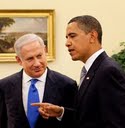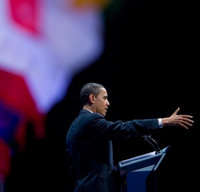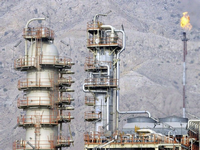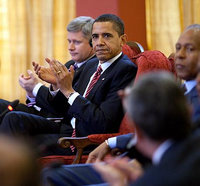For a part of the world that doesn’t have a lot of freedom, the Middle East certainly has a lot of elections that matter. On May 16, Kuwaitis elected a new parliament, sending women to the chamber for the first time. On June 7, Lebanese will go to the polls, and five days later, Iranians will have their turn. That Kuwaitis voted four women into office was a surprise even to close observers, who just a year ago had watched all of the female candidates go to defeat. As for the upcoming elections next month, handicappers expect an uneasy tie […]
Iran Archive
Free Newsletter
Banning Garrett beat me to this topic, which had been rattling around in the cranium for the past few days, with his essay at the New Atlanticist: There is an all-too-common practice in Washington punditry ofattributing strategic intentions to other countries without anyapparent evidence. . . . Assessments of strategic intentions are critically important ininter-state relations and should be made carefully and withconsiderable evidence. The stakes in getting it right or wrong can bevery high. Garrett writes in response to a Dan Blumenthal and Robert Kagan op-ed in the Washington Post discussing China’s intentions vis à vis North Korea. But […]
Yes, well, this is no surprise, really. I’d be pretty keen on directing a major potential competitor far away from the market I’m trying to corner, too. And if I could make some money on the deal, all the better. Unfortunately, the last “I” — for India — is no longer a sure thing on the IPI “Peace” Pipeline. The stabilizing effect that would have had would have made the deal at least a palatable trade-off for losing Iranian gas for Nabucco. Now I’ve seen some reports that the Iranian gas might end up in China after transiting Pakistan. If […]
I’m not sure I’d characterize the summit between the presidents of Afghanistan, Pakistan and Iran as “the latest sign of Iran’s emergence as the regional power,” as does the NY Times. I might think otherwise if Indian Prime Minister Manmohan Singh had joined them. But he didn’t, meaning this is basically the diplomatic equivalent of a block association meeting. It certainly can’t do any harm, could even do some good, and far from being an example of our inability to isolate Iran, is exactly the sort of thing that we should be — and increasingly have been — encouraging. But […]
David Horovitz, writing in today’s Jerusalem Post, paints a very compelling picture of the situation that Israeli Prime Minister Netanyahu finds himself in after this week’s meeting in Washington with President Barack Obama. Horovitz points out that Obama has left Netayahu with little “wiggle room” on the settlement issue: either stop all settlements, including “natural expansion” or be cast as obstructionists. Recall that the settlement issue is like kryptonite in Israeli domestic politics, and that Netanyahu himself rode to power defying a previous generation of Israeli leaders who tried to use the settlers as pawns in a wider peace initiative. […]

When two sides emerge from a diplomatic encounter and both of them can claim to have achieved their goals, we can consider the meeting a success. We don’t know exactly what transpired at the White House on Monday, and short of reading the minds of Israeli Prime Minister Benjamin Netanyahu or of President Barack Obama, we have no way of knowing how they truly believe their meeting went. Still, there are signs that both sides feel they achieved their objectives. As I predicted, the media focused sharply on the tension over Netanyahu’s reluctance to openly embrace the two-state solution for […]
My post on Iran’s nuclear deterrent bothered Sam Roggeveen, which usually indicates one of two things. Either, a) I need to clarify my argument; or b) I was wrong. I’ll go with option “a,” and see if that helps. The hard-line Israeli argument against an Iranian civilian nuclear program goes something like this: If Iran is allowed to master civilian nuclear technology — in particular the fuel enrichment cycle — it will eventually use that technology to arm itself with nuclear weapons. Those weapons will at worst pose an existential threat to Israel, and at best transform the strategic balance […]
Something about this NY Times piece on Oman’s smugglers touched a sympathetic chord in me. I’m pretty tolerant towards the idea of smugglers and the black market, in general, especially for things like refrigerators and TV sets. To begin with, smugglers fill a crucial subversive role that keeps even the most legitimate of governments honest. But in this case, the Omani smugglers aren’t just contravening Western sanctions against Iran. They’re also contravening Iranian law. So whatever harm they’re doing to efforts to isolate Iran are, to my mind, balanced by the harm they’re doing to the Iranian regime’s credibility. That […]
Monday’s meeting between President Barack Obama and Israeli Prime Minister Benjamin Netanyahu put the Iranian nuclear program in the spotlight. As one of the participants in the France 24 program I was on the other day put it, for Israel, “Iran and atom can’t exist.” The heart of the debate these days is how to keep that from happening,with this Patrick Barry post at Democracy Arsenal a good example of thecompeting views between whether coercion or engagement will work best.Barry discusses everything that’s changed since 2003 to diminish theU.S. ability to coerce Iran into foregoing a nuclear capacity. But amore […]
The speculation I’ve seen to date on the Obama administration’s approach to Iran’s nuclear program suggested that it was phasing out the demand for a freeze on uranium enrichment as a precondition for talks, instead making more intrusive IAEA inspections to protect against weaponization — the so-called Additional Protocols — the focus of any ultimate deal. Not so, according to this WSJ piece (via Friday Lunch Club). Instead, the Obama administration is likely to insist on the Additional Protocols as part of a substantial deal in addition to a “freeze for freeze” as a precondition for talks. The WSJ article […]

When President Barack Obama finally announced the location of his much-heralded speech to the Muslim world, the news came as a surprise. As a candidate, Obama had promised to give such an address during his first 100 days in office, as part of an urgent campaign to repair relations between the United States and Muslims. Observers wondered where Obama would go for the potentially historic occasion. Many believed the U.S. president would choose a democratic, Muslim-majority country for the event. Favorites included Jakarta, where Obama lived as a child. Turkey, a U.S. ally, also seemed like a good choice. Even […]
This is a great rundown by Marc Lynch of a New America Foundation panel discussion yesterday on the Israeli-Palestinian conflict. Lynch frames it as the context by which the Obama administration can use the next few weeks of high-profile visits, press conferences and speeches to set the table for a results-based regional policy. Lynch’s summary suggests that, similarly to the Afghanistan-Pakistan strategic rethink, a good deal of the work President Barack Obama has cut out for him is convincing the actors involved not just to do things that are painful or politically costly, but to redraw their strategic maps of […]
Regarding Iran’s helicopter attacks against PJAK camps in Iraqi Kurdistan over the weekend, John McCreary at NightWatch wonders: The curious point isthat combat aircraft from both Iranand Turkey violate Iraqiairspace with impunity while a USarmy and air force is responsible for protecting the country. That would seemto need an explanation by someone, but, then, this is the Middle East. That the Turkish aircraft get a pass is due to lobbying by PM Tayyip Recep Ergogan in November 2007 that has gone a long way towards redrawing the map of northern Iraq from a Turkish-Kurdish standoff into a Turkish-Kurdish partnership. There’s […]

For years, analysts have argued that the Nabucco natural gas pipeline — a U.S.-backed effort to transport gas from the Caspian Sea to Europe via Turkey, thus bypassing Russia — needed to accept gas from Iran if it was to be economically viable. But Iranian involvement in the project, which is intended to reduce European energy dependence on Russian gas exports, has been anathema for U.S. policymakers: Washington’s efforts to thwart Iran’s ambitions have so far overridden its desire to thwart Russia’s. That may be changing. The White House has appointed a new envoy for Eurasian Energy, Richard Morningstar, who […]

The first hundred days is an artificial benchmark for assessing presidential performance. In foreign policy, Barack Obama has not had time to do much, and the moves he has made have yet to produce clear consequences. He has, however, set a tone. It is reminiscent of the approach George W. Bush proposed in his 2000 campaign debate with Al Gore when he said, “If we’re an arrogant nation, they’ll resent us. If we’re a humble nation . . . they’ll welcome us.” Whether Mr. Bush’s foreign policy would have embodied that prescription had Osama bin Laden’s minions not struck the […]
President Barack Obama entered office with such an inflated cloud of expectations hanging over his head that it is not surprising that some are criticizing him now for his “failures.” After a mere 100 or so days in office, why hasn’t he solved the global financial crisis, reversed global warming and brought peace to the Middle East? On the other hand, some of his partisans are wont to claim major foreign policy successes for the new administration because of the president’s personal popularity and the tumultuous acclaim he has received during his overseas visits. Yet during his first few months […]
Friday Lunch Club quotes this WSJ article on Iran’s plans for regional hegemony in the Middle East: Arab states are especially concerned because Tehran has succeeded in transcending sectarian and ideological divides to create a coalition that includes Sunni movements such as Hamas, the Islamic Jihad, sections of the Muslim Brotherhood, and even Marxist-Leninist and other leftist outfits that share Iran’s anti-Americanism. . . . Tehran plays a patient game. Wherever possible, it is determined to pursue its goals through open political means, including elections. With pro-American and other democratic groups disheartened by the perceived weakness of the Obama administration, […]
